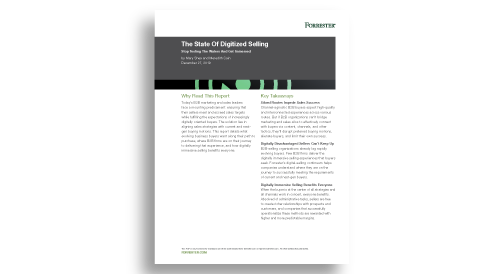Your buyers are increasingly doing business digitally, and your company needs to keep pace. Get up to speed with Forrester’s recent report, The State of Digitised Selling, which details how to align your sales and marketing strategies with current and next-gen buying patterns.
Buyers expect more from each sales touchpoint, so enablement and marketing leaders must all work together in enabling sellers to deliver in every digital interaction.
The benefits of digitally immersive selling are clear:
- Better experiences for buyers
- More consultative activities for sellers
- Better margins for companies

Download the report and learn how you can take practical steps in moving your company toward digital selling that drives results.